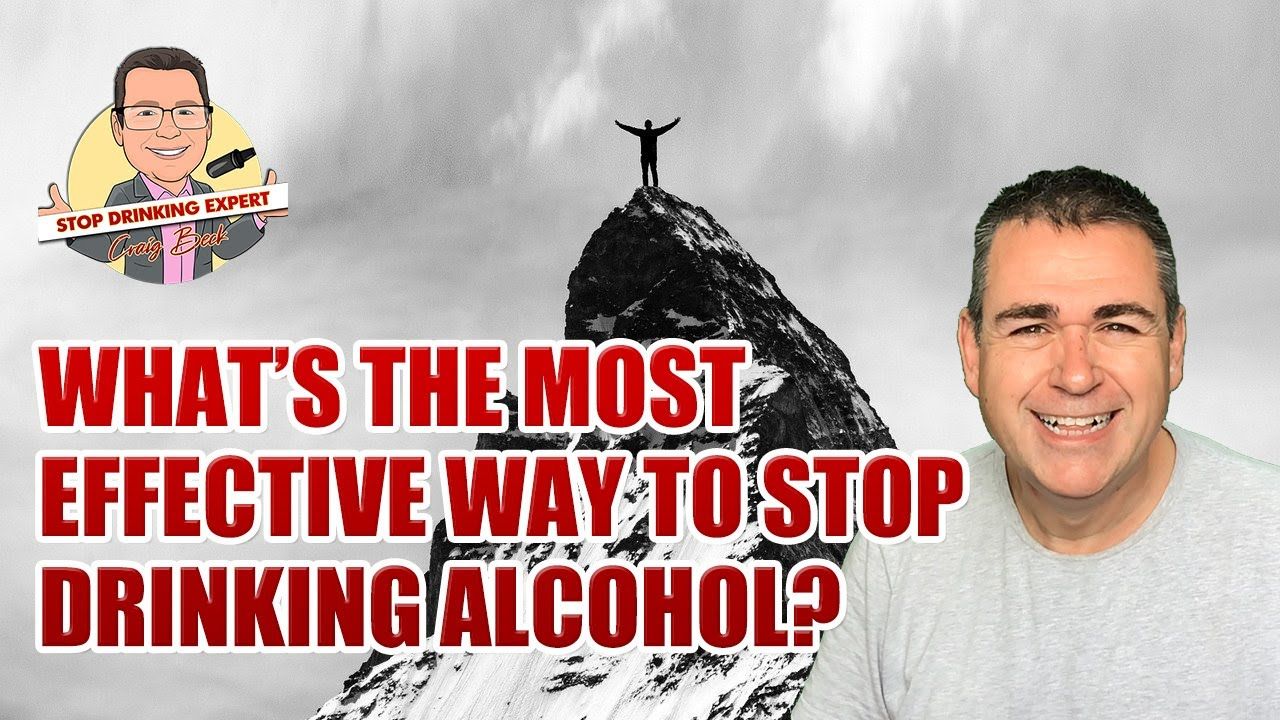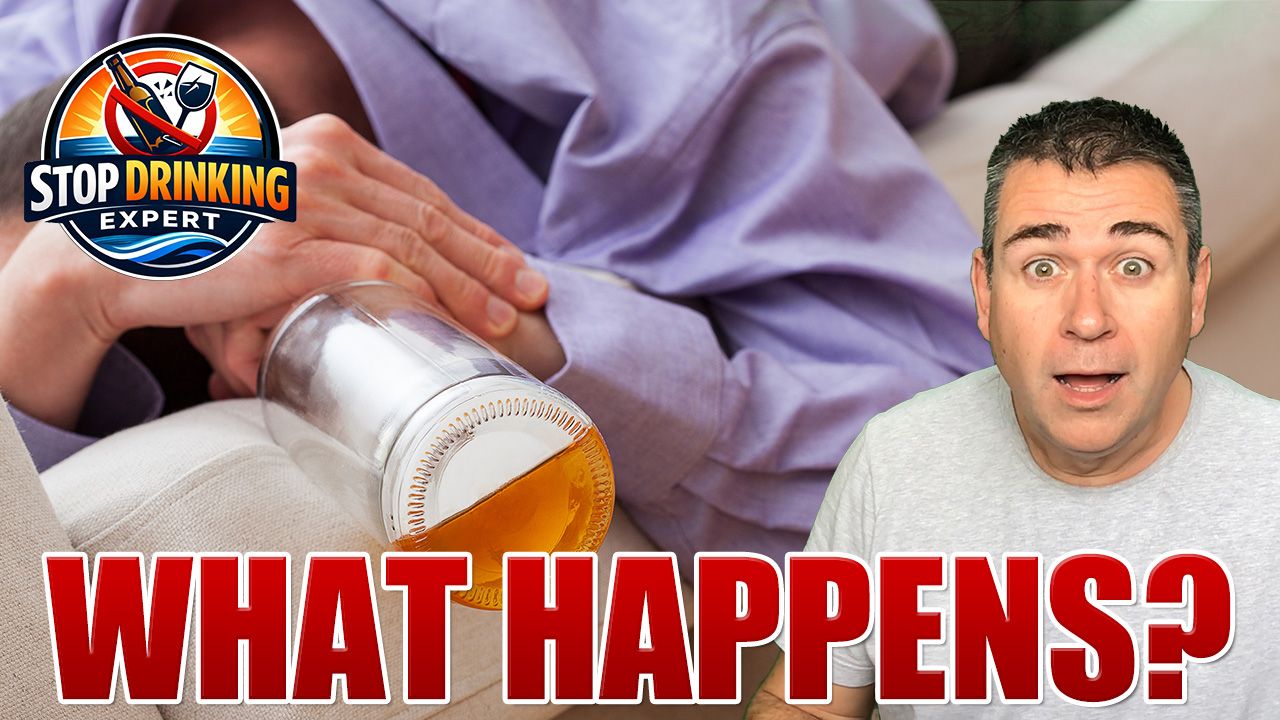What’s the Most Effective Way to Stop Drinking Alcohol Without AA?
May 20, 2025
What’s the Most Effective Way to Stop Drinking Alcohol Without AA?
Every evening the same weary question echoes through countless kitchens. Why can’t I just stop with one glass? You twist off a cap swearing tonight will be different yet the bottle still empties. If that cycle sounds painfully familiar you are not alone. Insight and action can disrupt it. The purpose of this article is simple. I will show you a practical route out of the maze that does not depend on Alcoholics Anonymous. It relies on modern psychology personal responsibility and a sprinkling of humour. Most important it leads you toward a free quit drinking webinar at StopDrinkingExpert.com where you can deepen the journey.
AA Works for Some Yet Not for Everyone
Across the Atlantic and the Pacific AA meetings offer comfort fellowship and a famous twelve step map. Many thrive there and that is splendid. Others attend out of duty then drift away feeling guilty. Why the split? The answer sits inside our unique wiring. Some people prefer collective ritual and a higher power. Others favour evidence based strategies private reflection and self directed momentum. Neither tribe is right or wrong. They are simply different. If you sit in the second camp ignoring that difference prolongs the struggle. The good news is that alternatives have blossomed over the last decade and they keep getting better.
Craig Beck the founder of Stop Drinking Expert once stood exactly where you might stand now. Champagne fuelled corporate dinners wrecked his mornings cost him focus and drained his wallet. When he tried conventional routes the language jarred with his rational nature. He went hunting for a plan that treated alcohol as the enemy not his own spirit. That hunt evolved into a structured method now used by over two hundred thousand readers viewers and course members. The philosophy is refreshingly direct. Shift your perception of alcohol then physical cravings lose steam and behavioural choices follow suit.
First Principle: Alcohol Delivers Nothing You Really Want
You may scoff at that claim in the same breath you defend your Friday night pinot. Yet pause and examine the ledger. Does the buzz actually fix stress or postpone it? Does the social lubrication improve conversation or turn it loud and circular? When you catalogue hangovers quarrels missed gym sessions foggy workdays and creeping anxiety the balance sheet leans heavily to loss. Recognising that truth lights the first candle in a dark cellar.
Evidence supports this shift in mindset. A landmark British study found that just four weeks of abstinence lowered liver fat by twenty five percent and boosted sleep quality by ten percent. Another American trial showed participants who reframed alcohol as a toxin rather than a treat cut consumption by nearly half within thirty days. Perception guides biochemistry more than most people imagine.
Second Principle: Learn to Surf Urges Instead of Fighting Them
Old school advice told you to grit your teeth and resist temptation. White knuckle warfare rarely ends well because willpower behaves like a smartphone battery. By dusk it dips into the red zone. Modern behavioural science suggests a smoother tactic. Picture each urge as a passing wave. You ride it with steady breath and curious attention until it breaks on the shore. No enemy exists. There is only sensation rising then falling. Practise that even twice a day and neurological circuits begin to rewire. Cravings lose intimidation once observed with calm eyes.
Dialectical Behaviour Therapy calls this technique urge surfing. A therapist named Alan Marlatt championed it in the nineties and the results still impress clinicians. Volunteers who mastered urge surfing reported fewer relapses and milder withdrawal symptoms. You can try it right now. Sit upright. Notice the desire. Rate its intensity from one to ten. Watch it for two minutes while breathing through the nose. Rate again. Most discover the number drops by at least two points.
Third Principle: Replace Instead of Remove
Nature abhors a vacuum. Strip away a nightly ritual and the brain grumbles. Give it a shiny alternative and morale improves. Some swap beer for alcohol free craft lager. Others grab sparkling water loaded with citrus slices and mint. One of my readers keeps chilled kombucha in designer bottles so gatherings still feel celebratory. The key is novelty and sensory pleasure. Splendid flavour colourful glassware and a slice of lime can trick the subconscious into feeling rewarded. Over weeks the new script embeds.
Remember boredom often masquerades as thirst. Schedule engaging diversions during danger hours. Ten push ups a brisk walk or a phone chat with a supportive mate flips the channel. Clients inside the Stop Drinking Expert community love the thirty minute challenge. Whenever a craving knocks they launch a thirty minute task from a prepared list. By the time they finish the urge has wandered off like a bored toddler.
Narrative Matters: Rewrite Your Personal Story
You might tell yourself I have an addictive personality or I am destined to fail. Those statements act like hypnotic commands. Flip them. Try I am learning to navigate life without booze or My body enjoys clarity. Keep a notebook by the kettle and jot down victories. Slept better. Saved thirty dollars. Remembered a whole film. Small wins accumulate fast. Within weeks you hold tangible evidence that sobriety suits you.
Language shapes reality. The phrase I can’t drink suggests deprivation while I don’t drink signals choice and authority. It is a subtle switch that reinforces control. Craig Beck calls this linguistic judo. Use it daily and watch resistance melt.
The Role of Community and Expertise
You do not need a dusty church basement if it makes you cringe. Still isolation breeds relapse. Online groups offer discreet camaraderie. Webinars provide live coaching with zero travel. The Stop Drinking Expert webinar streams regularly and covers myths psychology nutrition and a sustainable exit blueprint. Many attendees type questions in real time and receive tailored advice. That immediacy builds trust.
Curious about potential health perks once you quit? Browse Craig’s post on the benefits of quitting drinking. It lists scientific gains from sharper cognition to glowing skin. If loneliness fuels your habit read the candid article on drinking to help with loneliness. Both resources stir reflection and hope.
Strategies That Fail and Why
Many well meaning people attempt moderation. They declare wine only on weekends or spirits only at weddings. The rule cracks under emotion. Willpower falters. The flood returns. Others try geographical cures moving cities or swapping social circles. Unless mindset evolves the bottle follows in the suitcase. Even clever gadget hacks like counting units on an app miss the emotional forest for the numerical trees.
Perhaps you considered medical deterrents like disulfiram. They induce sickness if you drink. The catch is compliance. Skip one pill and the brain rejoices at the loophole. Research from Oxford University shows relapse rates approaching sixty percent within six months when medication stands alone. Psychological education must accompany any pharmacological aid.
Building a Personal Action Plan
Write the date you intend to quit. Circle it in bright ink. Announce the decision to at least one trusted ally. Remove alcohol from your flat because out of sight truly reduces consumption. Fill the fridge with nutritious snacks. Stock herbal teas and fizzy water. Download the Stop Drinking Expert quick start guide which arrives free after the webinar. Set reminders on your phone for water breaks because dehydration mimics cravings.
During the first week prioritise sleep. Go to bed earlier. Keep the room cool and dark. Adequate rest stabilises mood hormones. Add gentle exercise like stretching or walking. Movement flushes toxins and lifts serotonin. Keep meals balanced with protein complex carbs and healthy fat. Blood sugar crashes often masquerade as thirst for alcohol.
Pitfalls to Watch
Emotional ambushes loom in the second to fourth week. The novelty fades and unresolved feelings emerge. This is normal. Resist the urge to interpret it as failure. Instead book a therapy session or confide in a mentor. Journalling helps too. If physical withdrawal symptoms feel intense consult a physician. Most drinkers can quit safely at home yet some heavy users need supervised detox.
Another trap is overconfidence. Three clear weeks may lure you into testing moderation. Remember why you started. Play the mental video of past regret. Fast forward to the groggy morning after. Let that forecast protect your fresh freedom.
Why Signing Up for the Webinar Makes Sense
You could piece together tips from podcasts and social feeds. That route may work eventually though progress might crawl. A structured webinar condenses years of hard won wisdom into ninety lively minutes. Craig Beck guides you through mindset shifts daily tactics and sneaky marketing lies that keep society hooked. You finish with a printable plan and lifetime email support. People often say the aha moment lands before the session ends. Seats fill quickly because we limit numbers to maintain interaction. Booking takes less than one minute at StopDrinkingExpert.com.
Life on the Other Side of the Habit
The first morning you wake clear headed feels almost surreal. Coffee tastes richer. Traffic noise seems lighter. Tasks at work take half the time. Evenings stretch wide like a calm lake. You read actual chapters rather than scrolling memes. Weekends bloom with possibility from early hikes to late night boardgames. Savings accumulate. One client used the surplus to visit the Louvre another paid down stubborn debt. Relationships flourish because presence replaces apology.
Sexual health often improves too. Alcohol numbs nerves and disrupts hormone cascades. Removing it restores natural desire. For candid science peek at the blog entry on alcohol and sex drive. Confidence grows in tandem. When you know you can conquer a powerful drug other goals seem suddenly achievable. Career moves creative hobbies marathon dreams all stand within reach.
Summoning Your Decision
At this point you hold a toolkit. You understand the flaws in blind faith moderation. You grasp urge surfing and replacement rituals. You sense the value of community that aligns with evidence rather than dogma. The remaining ingredient is choice. Not tomorrow. Now. Click through to the free webinar. Anchor the intention by entering your email and reserving a seat. Then mark the calendar. Momentum loves speed. When the webinar begins listen with an open mind and a notebook. Ask questions. Picture how liberated you will feel in ninety days. That vision is not fantasy. Thousands report it as daily reality. You can join them.
Final Thoughts
Stopping drinking without AA is entirely possible and increasingly common. Science practical wisdom and modern online tools have converged to create a clear avenue. Walk that avenue with guidance and you reduce detours. If doubts linger recall that indecision costs energy while action generates it. Take the step. Your future self will thank you in a hundred colourful ways.
References
- Smith J A 2019 Alcohol consumption and liver fat reduction The British Medical Journal
- Chen H and Garcia L 2021 Reframing Substance Value Improves Self Regulation Journal of Behavioral Health
- Marlatt A 1994 Urge Surfing Technique in Relapse Prevention Clinical Psychology Review
- Nguyen P 2023 Comparative Analysis of Disulfiram Compliance Rates Oxford Journal of Addiction Medicine
⚠️ Medical Disclaimer: This article is for educational purposes only and not a substitute for professional medical advice. Alcohol withdrawal can be dangerous. If you have been drinking heavily, consult a healthcare provider before stopping. If you're experiencing a medical emergency, call emergency services immediately.








